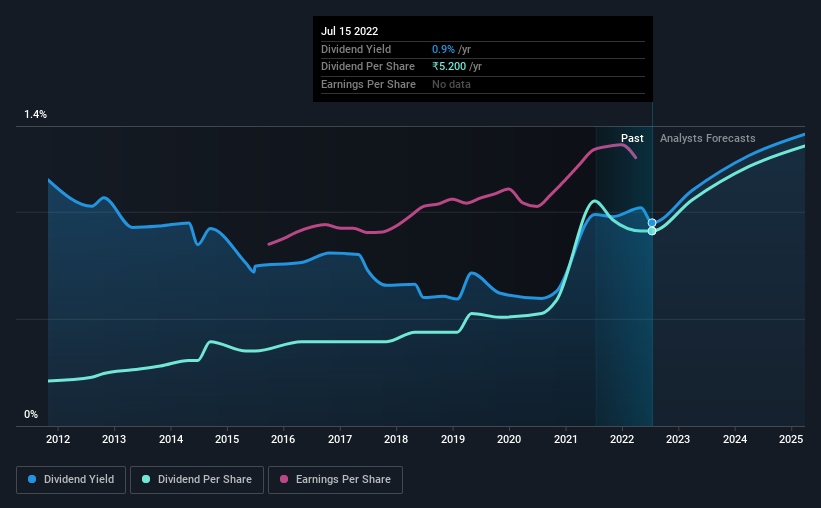
Dabur India Limited's (NSE:DABUR) dividend is being reduced from last year's payment covering the same period to ₹2.70 on the 11th of September. This payment takes the dividend yield to 0.9%, which only provides a modest boost to overall returns.
See our latest analysis for Dabur India
Dabur India's Payment Has Solid Earnings Coverage
It would be nice for the yield to be higher, but we should also check if higher levels of dividend payment would be sustainable. Prior to this announcement, Dabur India's dividend was comfortably covered by both cash flow and earnings. This indicates that a lot of the earnings are being reinvested into the business, with the aim of fueling growth.
The next year is set to see EPS grow by 49.8%. If the dividend continues on this path, the payout ratio could be 41% by next year, which we think can be pretty sustainable going forward.

Dividend Volatility
While the company has been paying a dividend for a long time, it has cut the dividend at least once in the last 10 years. Since 2012, the annual payment back then was ₹1.20, compared to the most recent full-year payment of ₹5.20. This implies that the company grew its distributions at a yearly rate of about 16% over that duration. Despite the rapid growth in the dividend over the past number of years, we have seen the payments go down the past as well, so that makes us cautious.
Dabur India Could Grow Its Dividend
Given that the dividend has been cut in the past, we need to check if earnings are growing and if that might lead to stronger dividends in the future. Dabur India has seen EPS rising for the last five years, at 6.3% per annum. Earnings are on the uptrend, and it is only paying a small portion of those earnings to shareholders.
In Summary
Even though the dividend was cut this year, we think Dabur India has the ability to make consistent payments in the future. While the payout ratios are a good sign, we are less enthusiastic about the company's dividend record. Taking all of this into consideration, the dividend looks viable moving forward, but investors should be mindful that the company has pushed the boundaries of sustainability in the past and may do so again.
It's important to note that companies having a consistent dividend policy will generate greater investor confidence than those having an erratic one. Meanwhile, despite the importance of dividend payments, they are not the only factors our readers should know when assessing a company. For example, we've picked out 1 warning sign for Dabur India that investors should know about before committing capital to this stock. Is Dabur India not quite the opportunity you were looking for? Why not check out our selection of top dividend stocks.
New: Manage All Your Stock Portfolios in One Place
We've created the ultimate portfolio companion for stock investors, and it's free.
• Connect an unlimited number of Portfolios and see your total in one currency
• Be alerted to new Warning Signs or Risks via email or mobile
• Track the Fair Value of your stocks
Have feedback on this article? Concerned about the content? Get in touch with us directly. Alternatively, email editorial-team (at) simplywallst.com.
This article by Simply Wall St is general in nature. We provide commentary based on historical data and analyst forecasts only using an unbiased methodology and our articles are not intended to be financial advice. It does not constitute a recommendation to buy or sell any stock, and does not take account of your objectives, or your financial situation. We aim to bring you long-term focused analysis driven by fundamental data. Note that our analysis may not factor in the latest price-sensitive company announcements or qualitative material. Simply Wall St has no position in any stocks mentioned.
About NSEI:DABUR
Excellent balance sheet average dividend payer.
Similar Companies
Market Insights
Community Narratives



